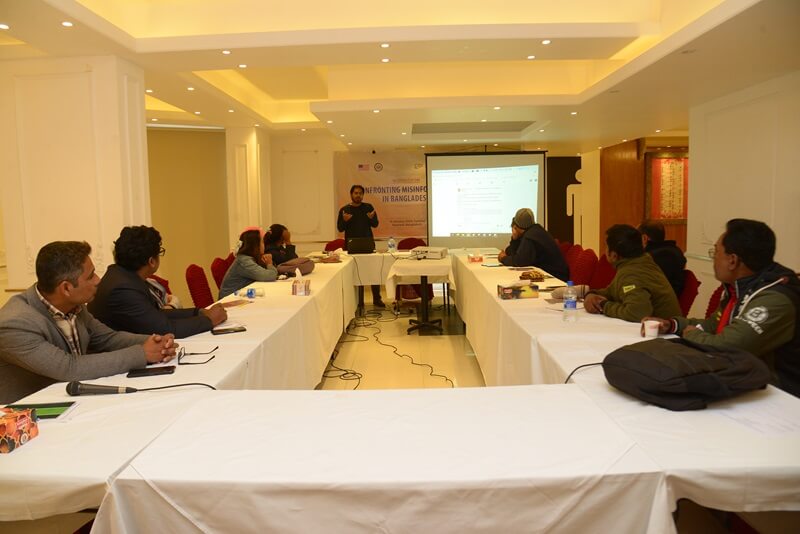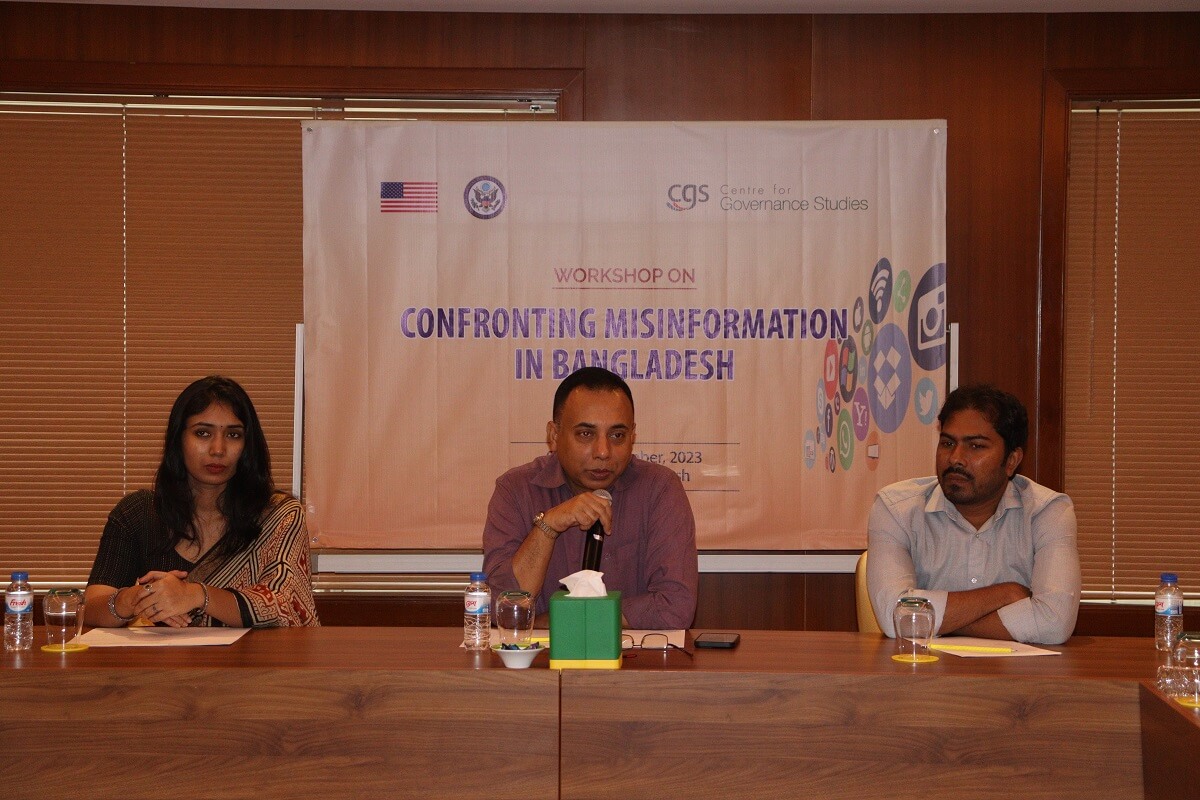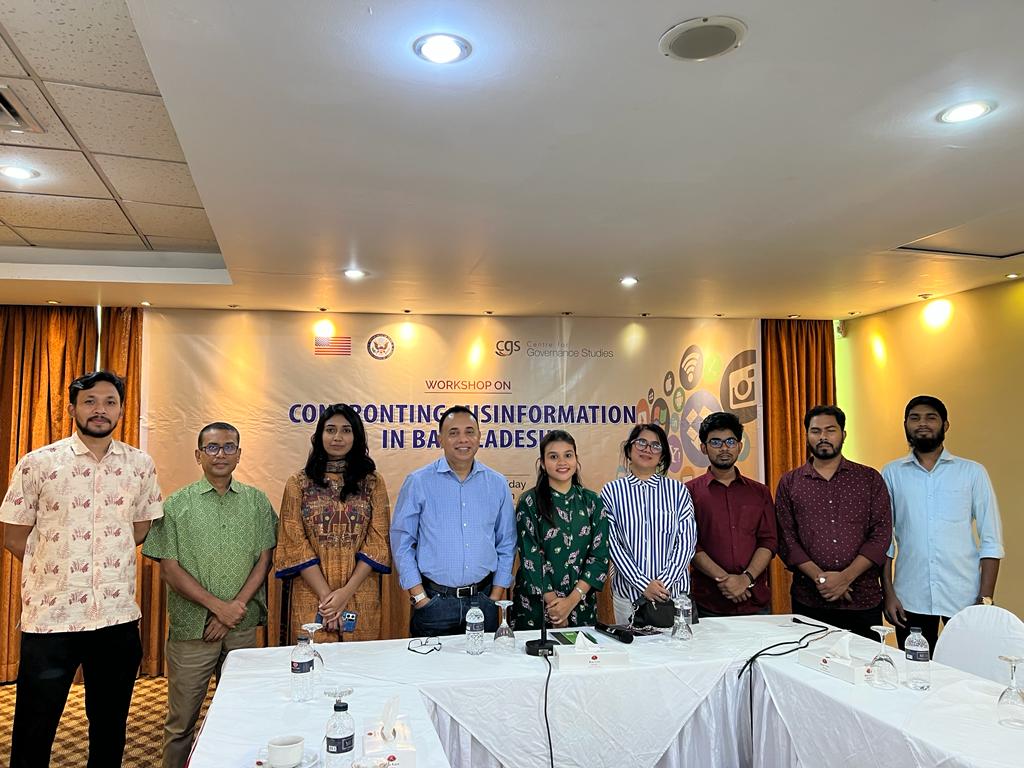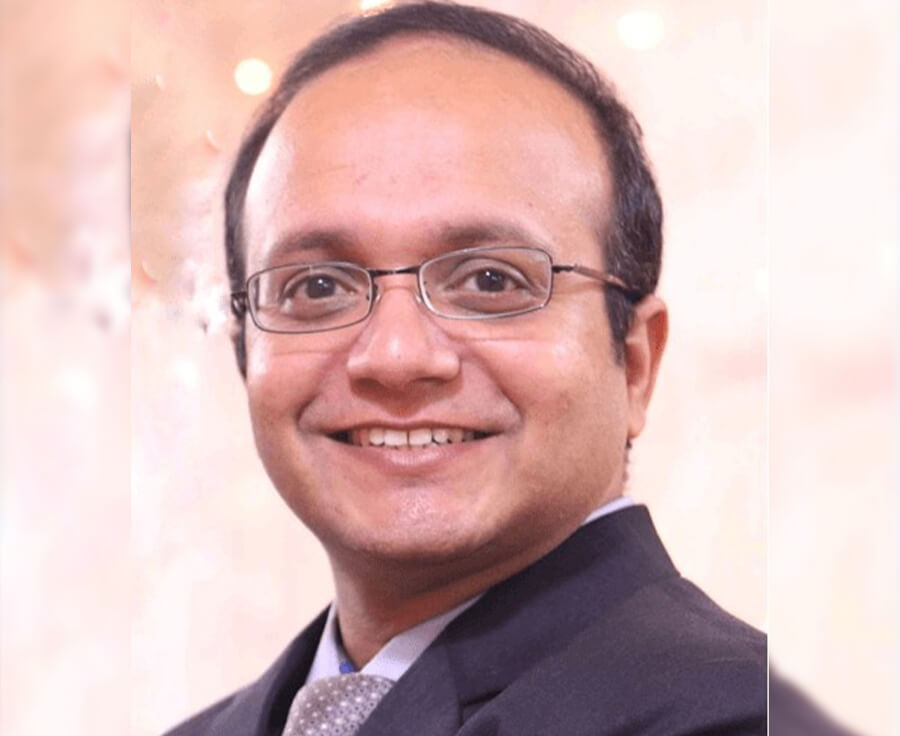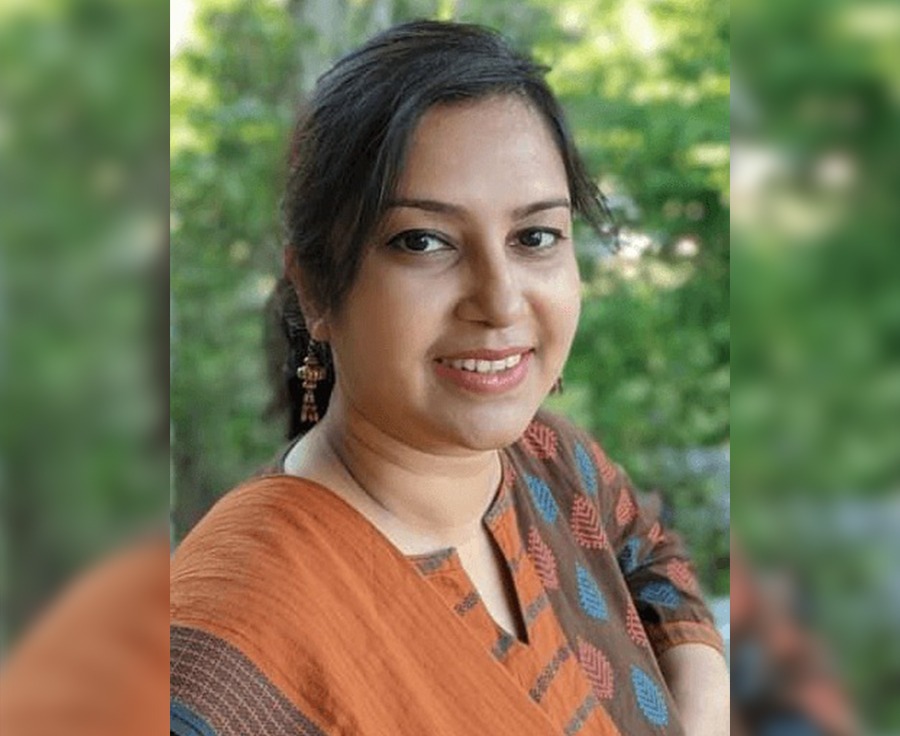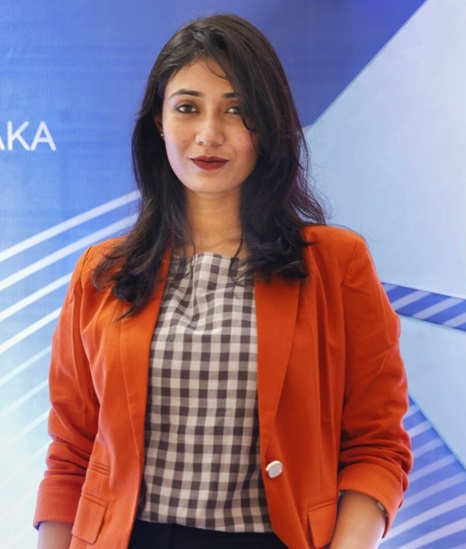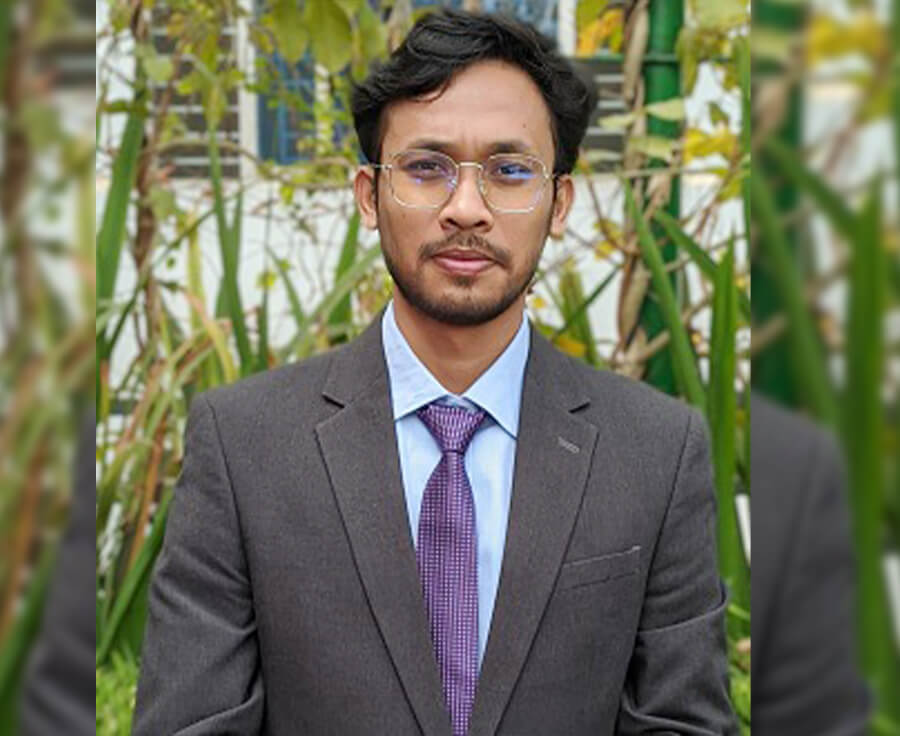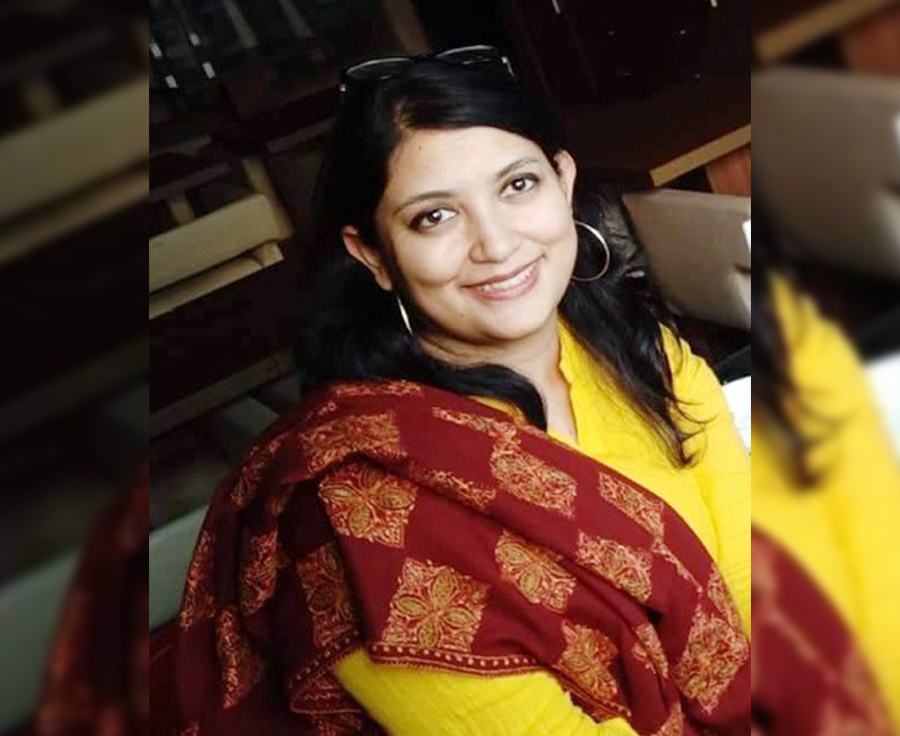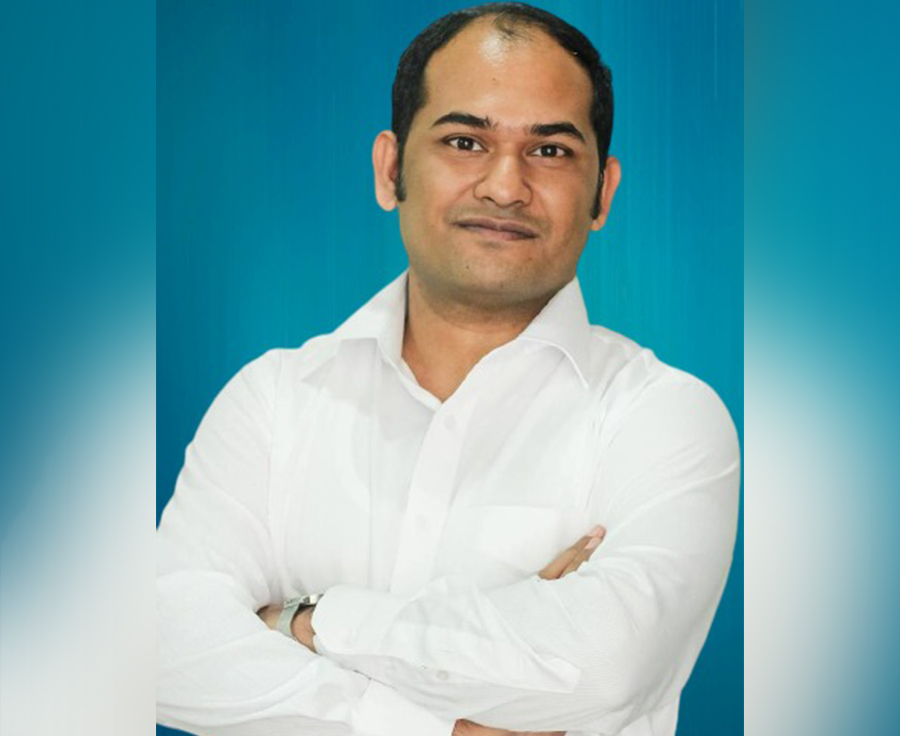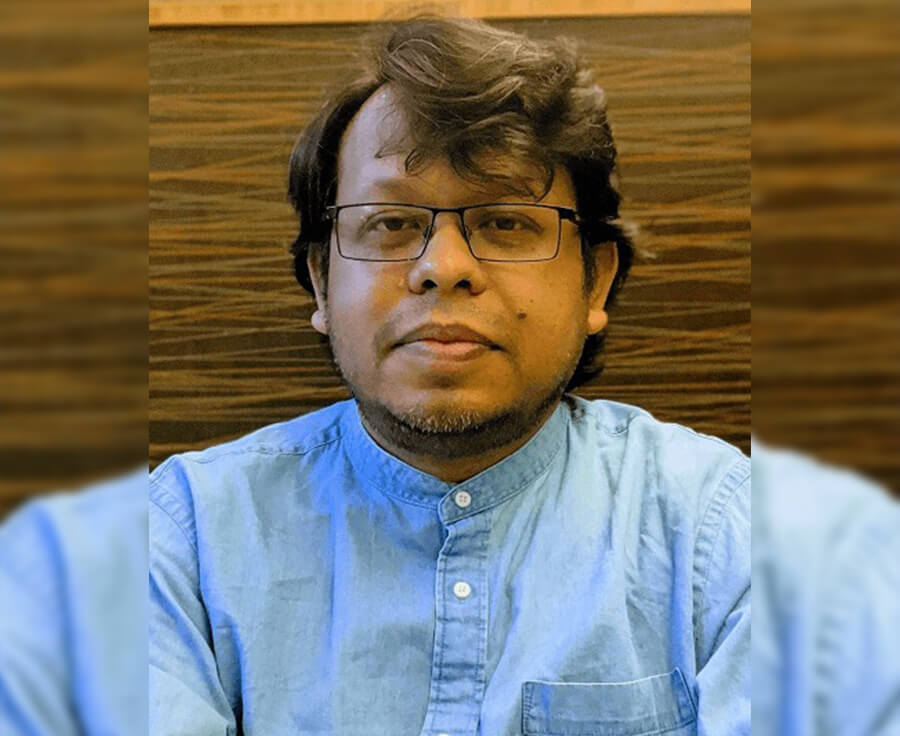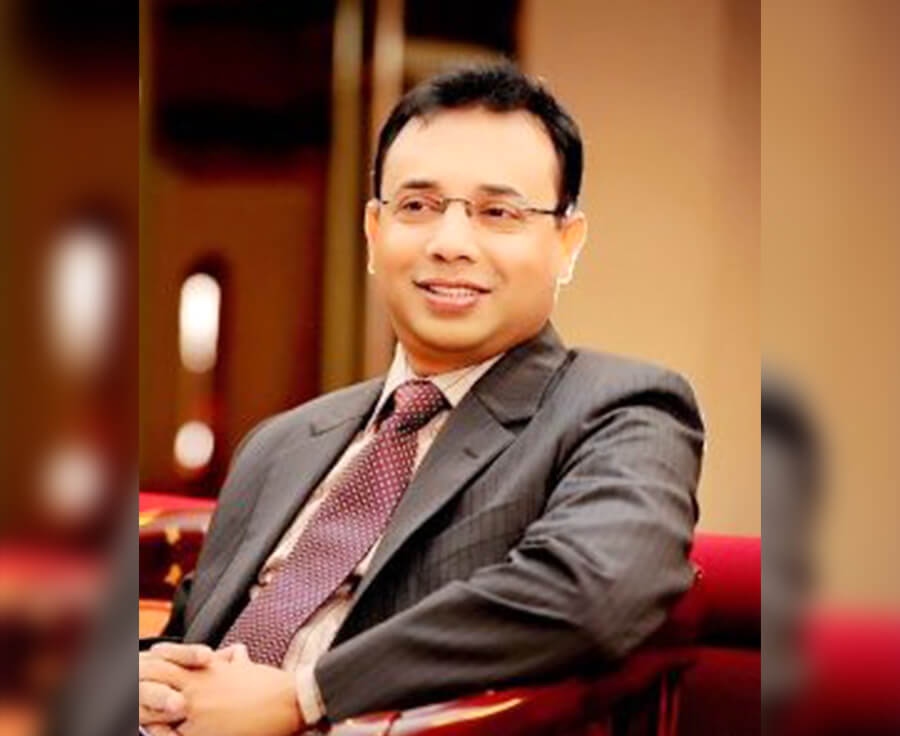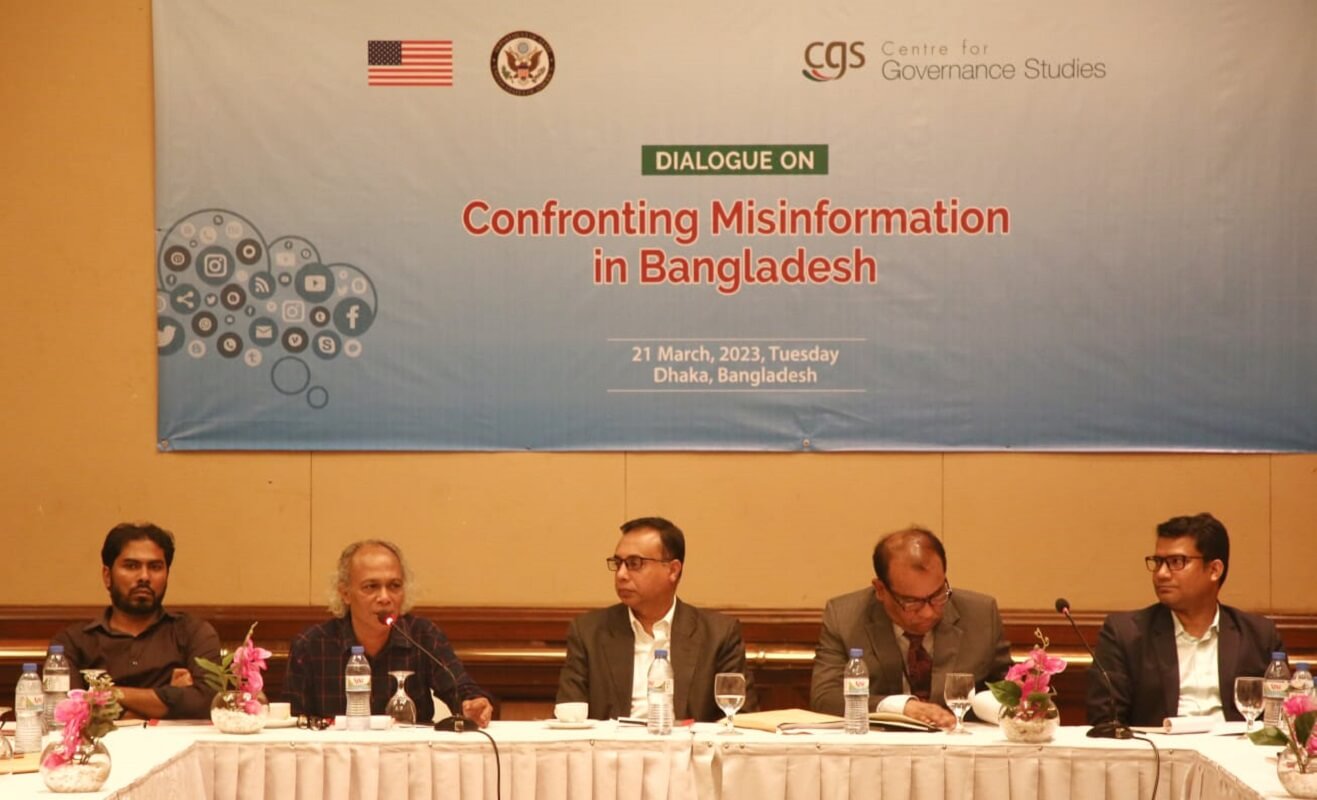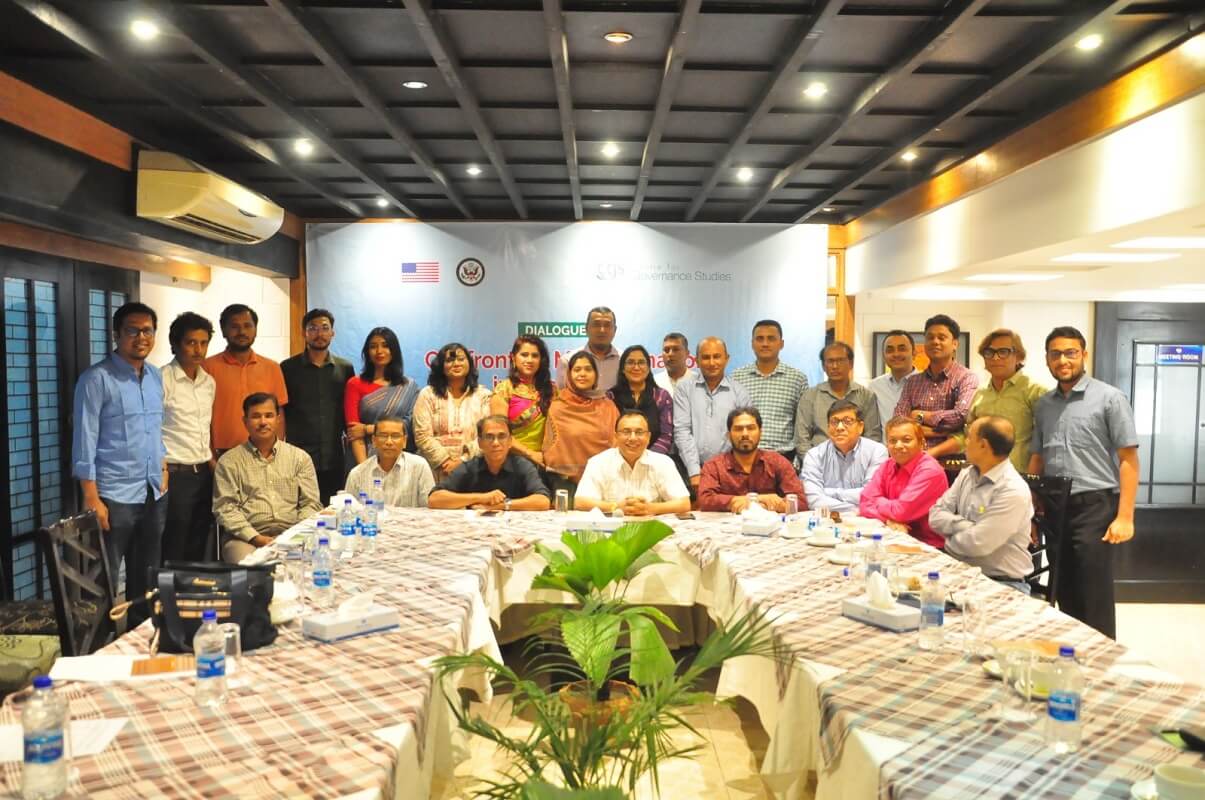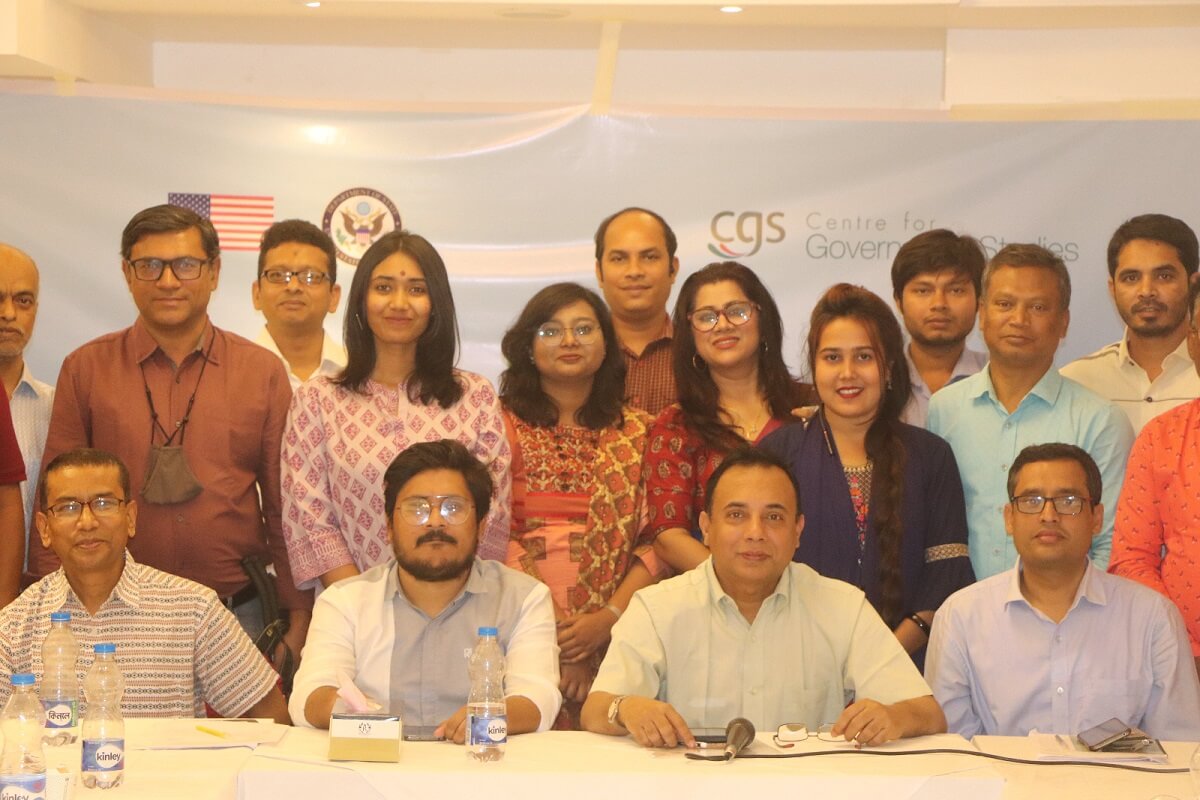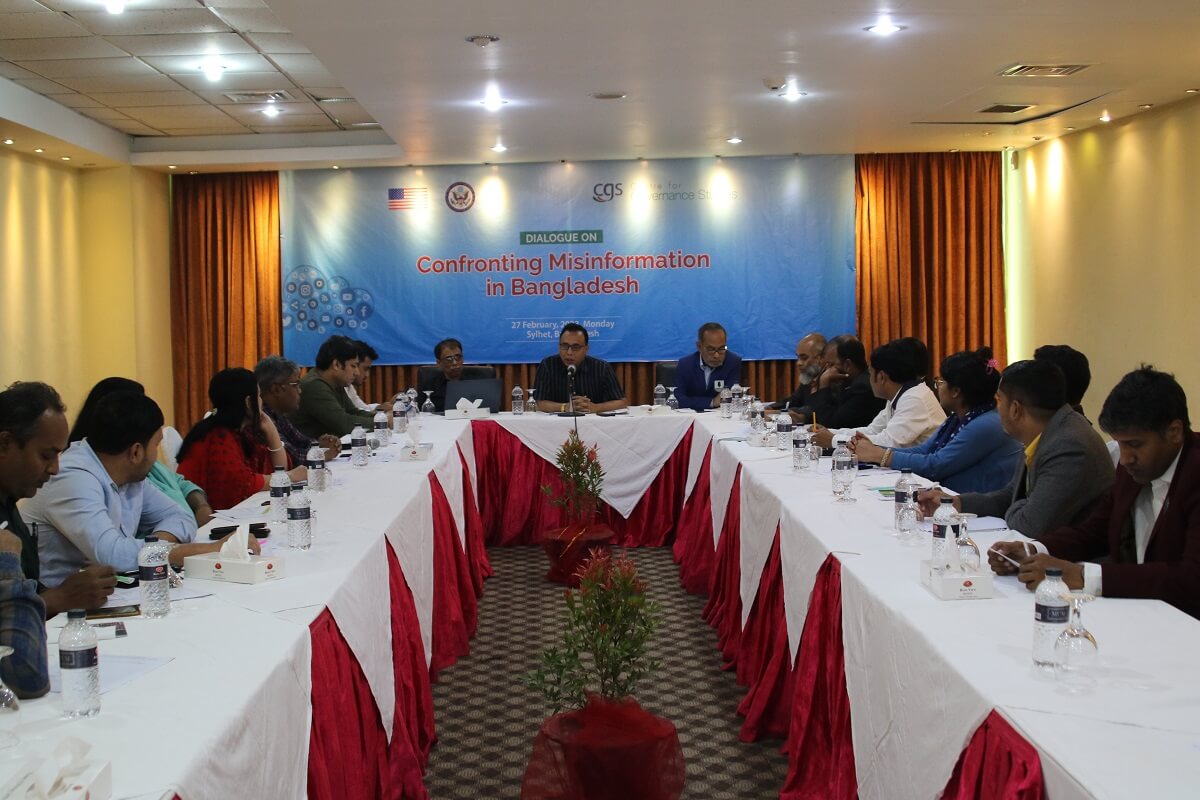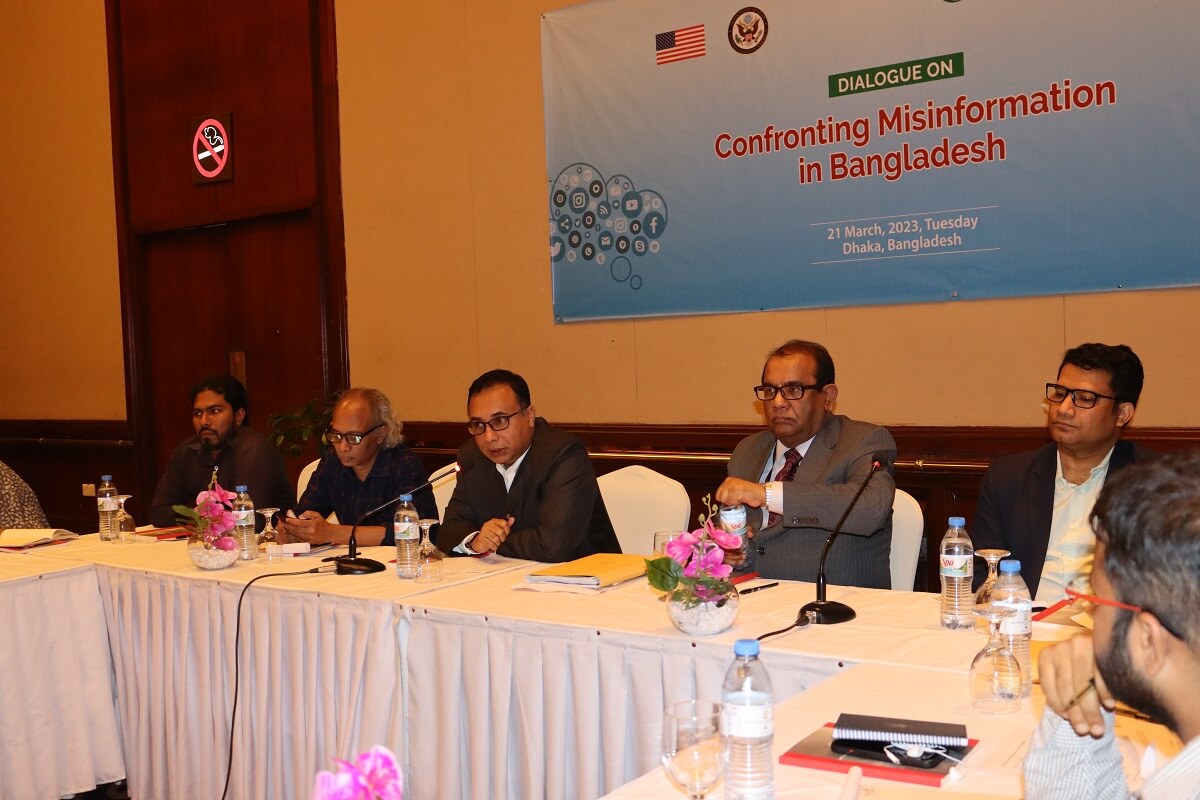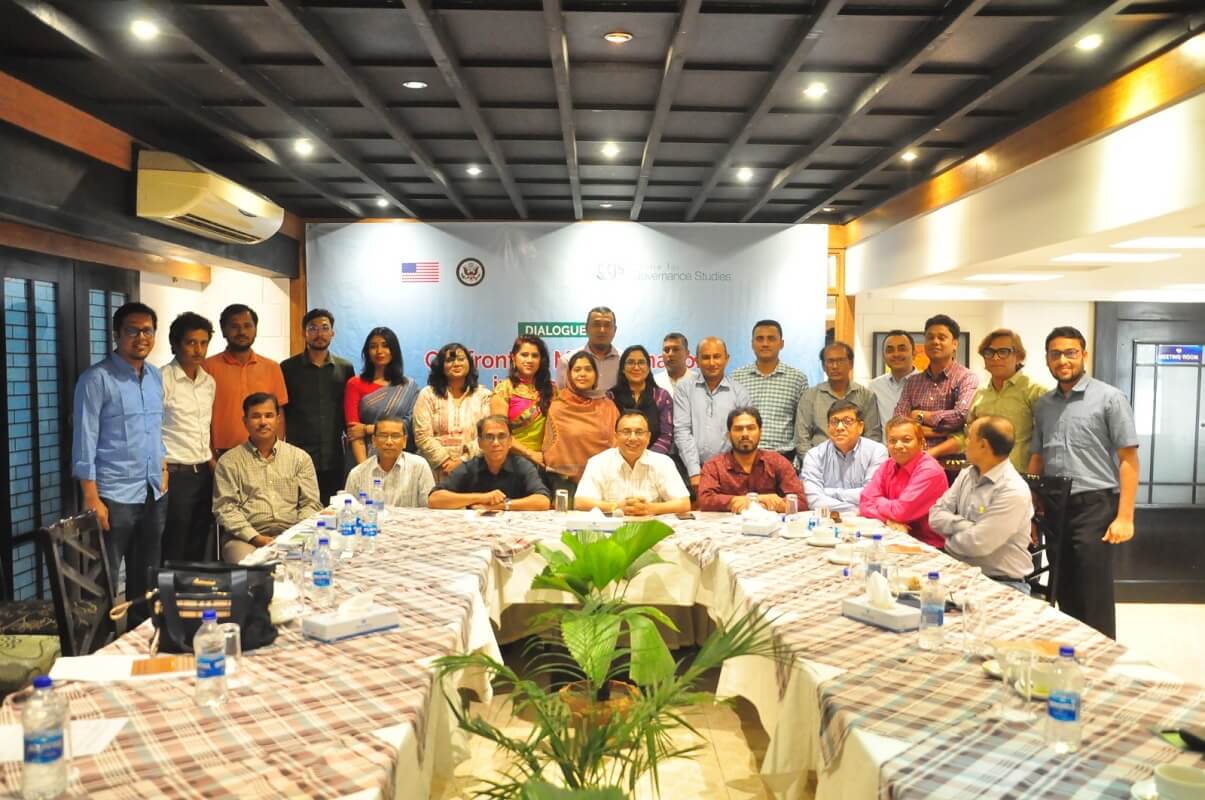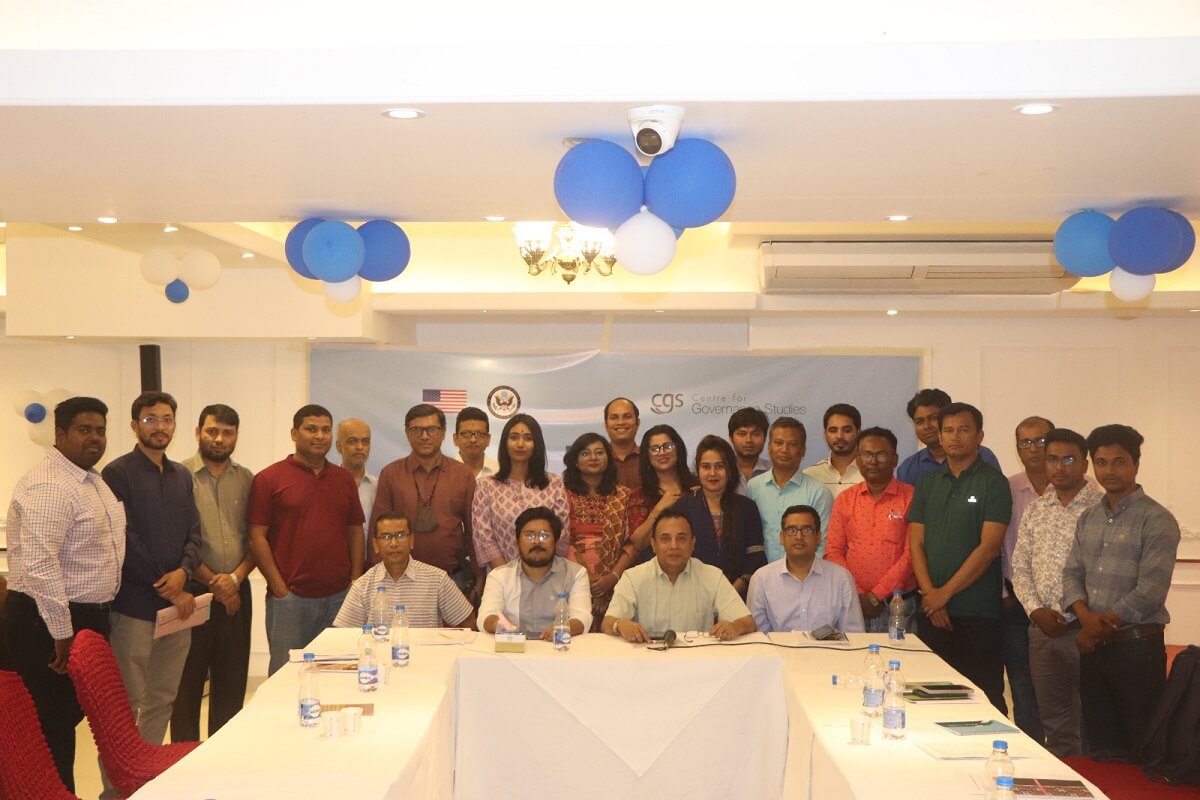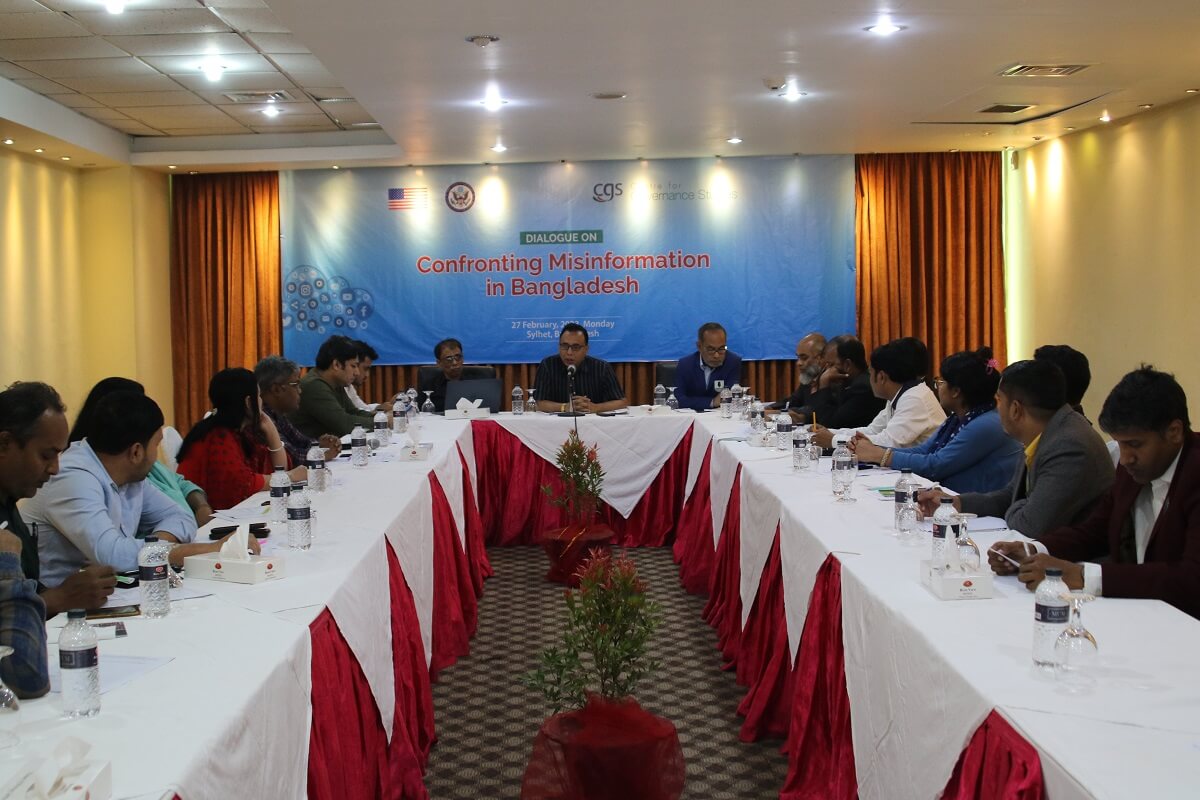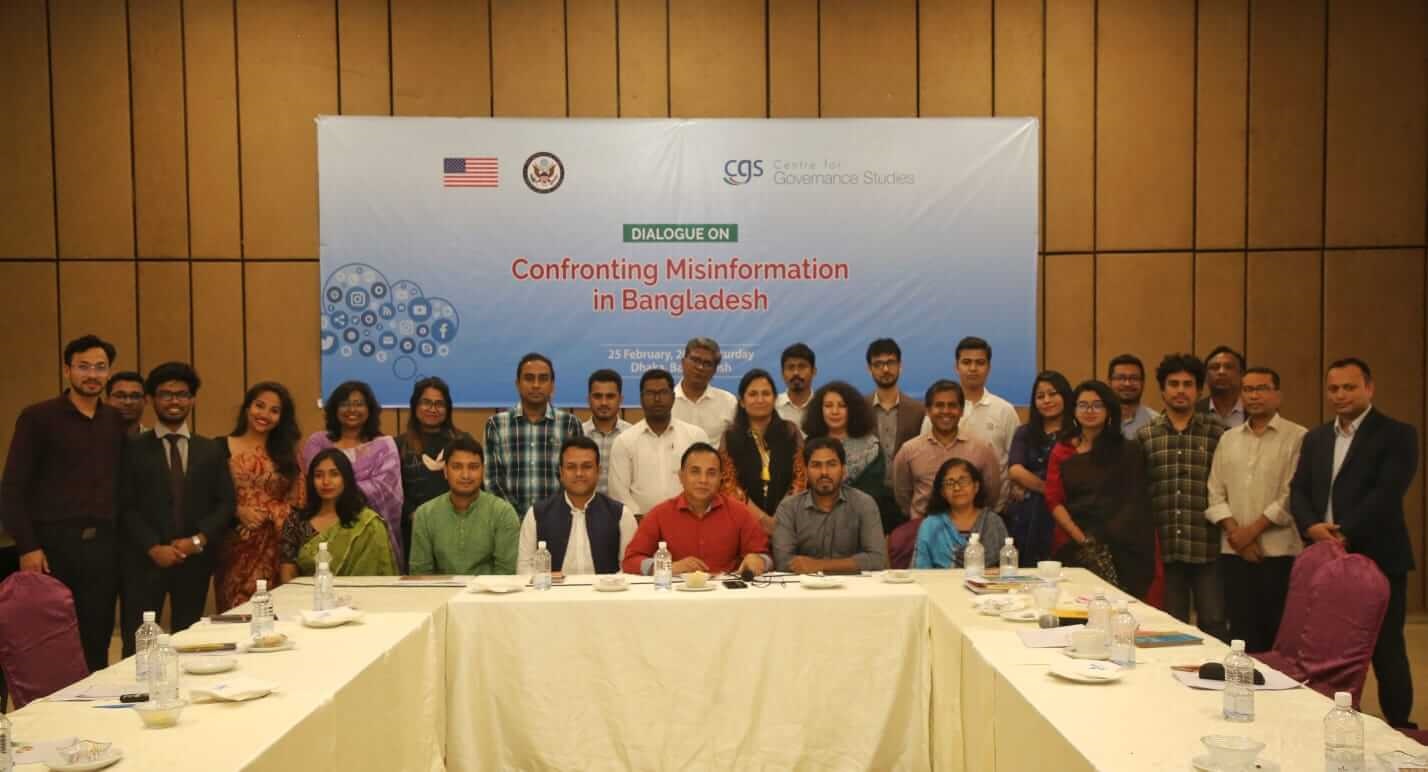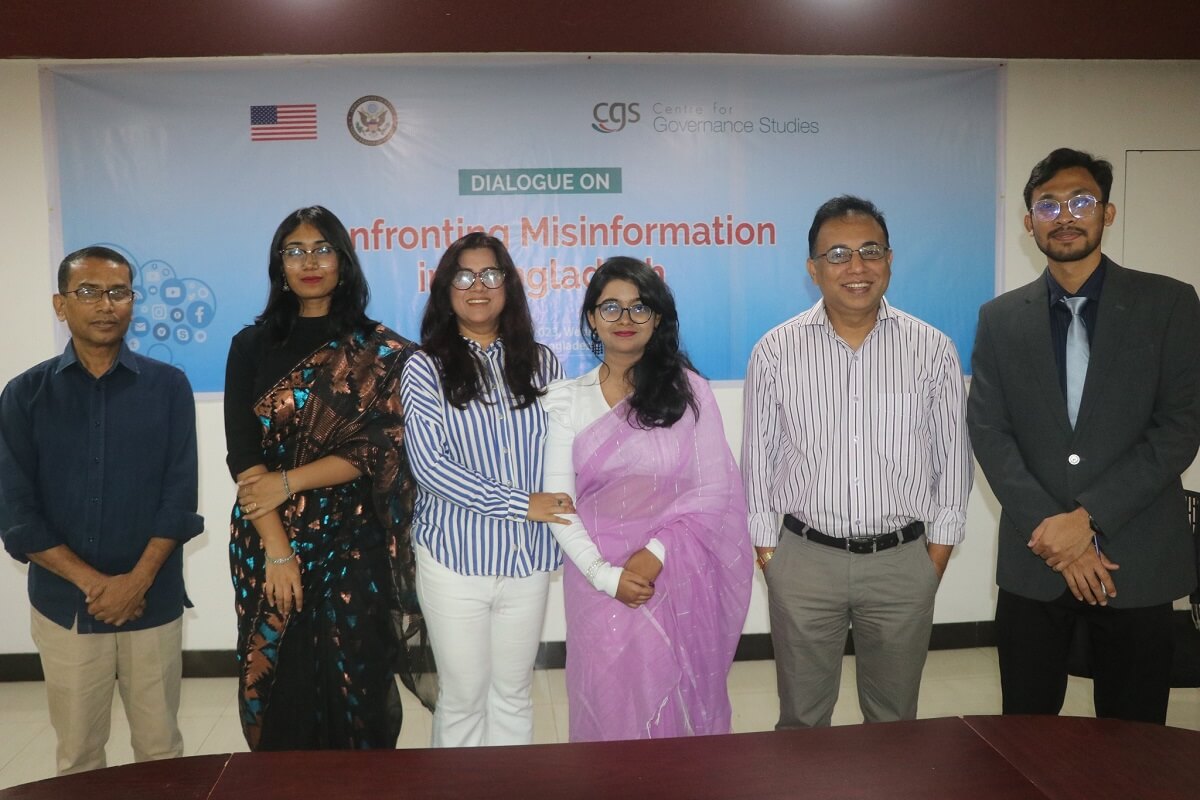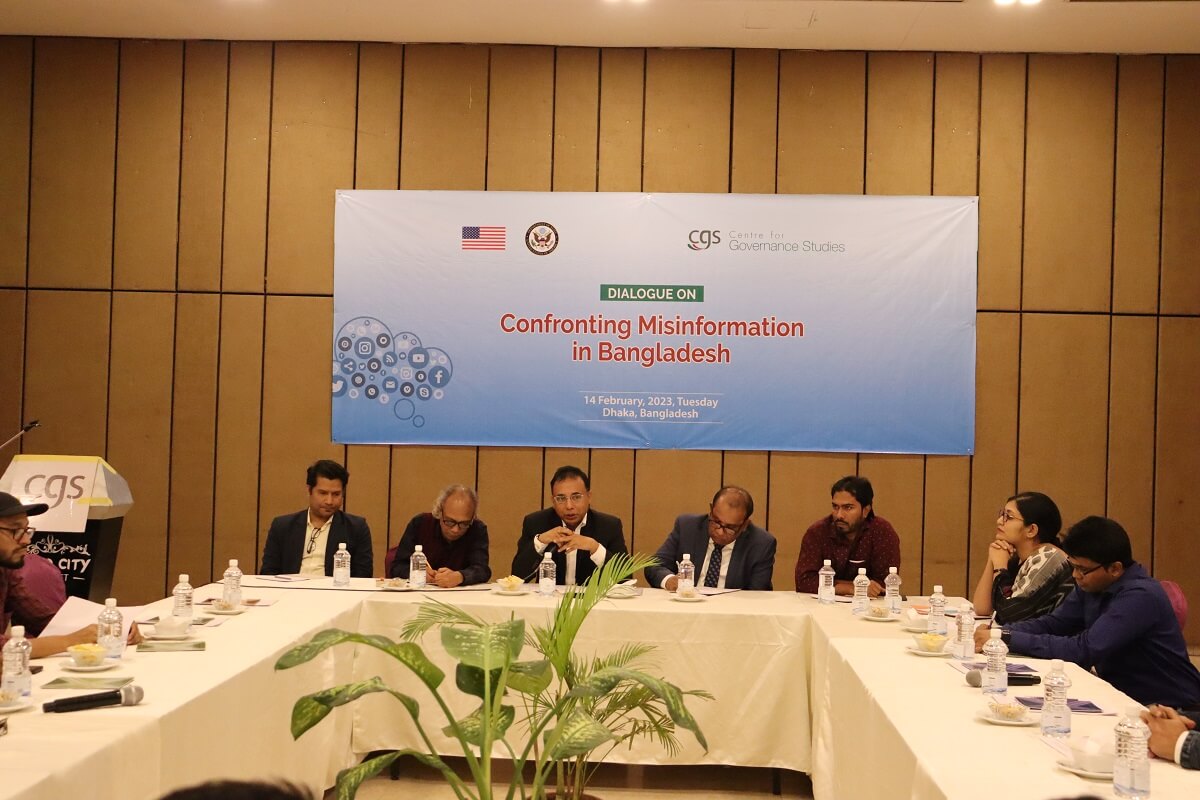Dhaka, 21March 2023
In an effort to tackle the growing concerns surrounding fake news in Bangladesh, the Centre for Governance Studies (CGS), in collaboration with the U.S. Department of State, organized a dialogue titled "Confronting Misinformation in Bangladesh". The event was held at Pan Pacific Sonargaon in Dhaka on March21, 2023.
The dialogue is part of a series of sessions aimed at understanding how misinformation is produced and recirculated in Bangladesh. The attendees comprised of journalists, senior editors, professional fact-checkers, and social media influencers. Dr. Kajalie Islam, Associate Professor, Mass Communication and Journalism, University of Dhaka, Manjur A. Chowdhury, Chairman, Centre for Governance Studies (CGS) and Mahbubur Rahman,Strategic Communications Advisor, Embassy of the United States of America were guests of the event and gave their valuable speech. Speakers including Nurul Kabir, Editor, New ageand Qadaruddin Shishir, Fact Check Editor atAgence France-Presse (AFP)shared their thoughts and insights.
The event's introductory remarks were delivered by the CGS Executive Director Zillur Rahman, who noted that as it is an election year, there may have been an excessive amount of ambiguous news. He explained that while it has been reported that Bangladesh is the only nation to provide fuel and petrol subsidies, the truth is that there are a great number of other nations that do as well, and this kind of false information is disseminated widely. He continued by saying that due to its politicization, the mainstream media is no longer trusted by the public. He also made the observation that journalists no longer seem to be as interested in journalism, as seen by the fact that the same news is covered verbatim in many newspapers.
The speakers and the participants mentioned some very important issues that are constraining journalists and mass people from reporting the authentic news. Some of the major reasons that came out throughout the discussion are the DSA Act, Competition among the newspapers, Pressure for fast reporting, not enough resources for the journalists and no mentionable training for the journalists.
According to Mahbubur Rahmanthis kind of presentation should be scheduled frequently. He also expressed the hope that the dissemination of false information will quickly diminish.
Nurul Kabir claimed thatSmart Bangladesh is a dangerous word because it is one kind of violation of human rights.Access to every aspect of a citizen's personal information may be available to all government agencies. Heclaimed that, unlike other sectors of Bangladesh, traffic management does not have law enforcement. He continued by saying that it makes no difference whose party is in power since they constantly strive to rule the populace. Yet, we should put our duty to uphold our profession and remain impartial above all else as journalists.
Qadaruddin Shishir said that people process information differently, sometimes consciously and other times unconsciously, leading to misinformation. We must therefore exercise caution when reporting on the news. He counseled journalists to share responsibility for decreasing fake news and to use caution while sharing unclear and false material on social media.
Manjur A Chowdhury said that false information has a significant impact on social phenomena. Anyone who has experienced this tension can understand it. He used CNN as an illustration of how they place a strong emphasis on journalism by saying that misinformation is much more tragic than a father committing suicide.That’s the way journalism should be inaugurated.
After the roundtable discussion, participants took part in a survey and a focus group discussion to provide more in-depth information and their perspectives on fake news. The data collected during these dialogues will be used to enhance the capacity of journalists and encourage social media influencers in Bangladesh to effectively counter misinformation, particularly during election periods.
The discussion was moderated by Zillur Rahman, the Executive Director of CGS.
Chattogram, 15March 2023
In an effort to tackle the growing concerns surrounding fake news in Bangladesh, the Centre for Governance Studies (CGS), in collaboration with the U.S. Department of State, organized a dialogue titled "Confronting Misinformation in Bangladesh". The event was held at Well Park hotel in Chattogram on March15, 2023.
The dialogue is part of a series of sessions aimed at understanding how misinformation is produced and recirculated in Bangladesh. The attendees comprised of journalists, senior editors, professional fact-checkers, and social media influencers. Speakers including Zahid Newaz Khan, Chief News Editor, Channeli, and Qadaruddin Shishir, Fact Check Editor at Agence France-Presse (AFP)shared their thoughts and insights.
The speakers and the participants noted that the source of misinformation should be identified and the verification problemcan be mitigated if we are more cordial and utilize online technology. The need for accurate and diverse information to reach everyone, especially minorities, was emphasized. The speakers agreed that preventing the spread of fake news and misinformation is crucial to ensuring trustworthy journalism and upholding democracy.
Zillur Rahman, the Executive Director of CGS gave the event’s opening speech and discussed the importance of preventing misinformation in Bangladesh. He added that journalists can play a key factor in minimizing this issue along with the fact-checker. He also includes the objective and summary of this dialogue session.
Zahid Newaz Khanclaimed that we are currently living in a postmodern era where fake news permeates everything, most politicians spread false information, and journalists disseminate that news on their own initiative.He emphasized that social media is playing a significant part in this and that, with the development of AI, our preferences and personal beliefs usually come first.Cross-checking should be standard practice in journalism, but these days people are so quick to accept information at face value that they don't even bother to examine the sources. He also mentioned that we should have common sense and be cognizant of sharing our posts and thoughts wisely and consciously.
Qadaruddin Shishirgave his account of how fact-checking led to the discovery of some false information.He issued a warning about considering journalism to be the Avatar of truth. He also made note of the fact that certain major newspapers run showy headlines that have little to do with the actual story, which causes enormous issues because most readers only read the headlines rather than the whole story. Finally, he advised the journalists to shoulder some of the blame for reducing fake news and be cautious about disseminating ambiguous and inaccurate information on social media.
After the roundtable discussion, participants took part in a survey and a focus group discussion to provide more in-depth information and their perspectives on fake news. The data collected during these dialogues will be used to enhance the capacity of journalists and encourage social media influencers in Bangladesh to effectively counter misinformation, particularly during election periods.
The discussion was moderated by Zillur Rahman, the Executive Director of CGS.
Rajshahi, 11March 2023
In an effort to tackle the growing concerns surrounding fake news in Bangladesh, the Centre for Governance Studies (CGS), in collaboration with the U.S. Department of State, organized a dialogue titled "Confronting Misinformation in Bangladesh". The event was held at the Royal RajHotel in Rajshahi on March 11, 2023.
The dialogue is part of a series of sessions aimed at understanding how misinformation is produced and recirculated in Bangladesh. The attendees comprised journalists, senior editors, professional fact-checkers, and social media influencers. Speakers including Professor Dr. Pradip Kumar Panday, Professor, Department of Mass Communication & Journalism, and Minhaj Aman, Research Head, Dismislab shared their thoughts and insights.
The speakers and the participants noted that misinformation is now hugely spreading by social media, highlighting a structural problem and agendas in media houses. They also discussed the power of sources of misinformation, including syndicates and personal interests. The speakers agreed that preventing the spread of fake news and misinformation is crucial to ensuring trustworthy journalism and upholding democracy. The people of Bangladesh still rely on journalism more than anything. So, we should work on this with the help of new digital technology.
Dr. Pradip Kumar Pandayhighlighted that journalism is now a day facing challenges, and the generation gap has become vigilant. Journalism has changed the way we used to before. As we live in an ocean of information, we have to be conscious about picking information whether it is misinformation or not. He also refers to general definitionsof misinformation, disinformation, and malformation and pointed out that politicians, businessmen, reporters, and sometimes peopleown self disuse the information actually. He emphasized that journalists should check the source of news not just once but more than that even if takes time to do so.
Minhaj Amantalked abouthow he developed his fact-checkinginstitution dismislabsince 2017. He stated that theyidentified which mainstream media spread which type of misinformation and tried to find out different fake news. Regarding this,he found 10 websites and some Facebookprofiles and pages to spread out the fake news about the DB lottery. He also pointed out that the sub-editor should play an important role to mitigate this problem and sometimes the reporter too.
After the roundtable discussion, participants took part in a survey and a focus group discussion to provide more in-depth information and their perspectives on fake news. The data collected during these dialogues will be used to enhance the capacity of journalists and encourage social media influencers in Bangladesh to effectively counter misinformation, particularly during election periods.
The discussion was moderated by Zillur Rahman, the Executive Director of CGS.
Sylhet, 27February 2023
Centre for Governance Studies (CGS), in collaboration with the U.S. Department of State, arranged a dialogue titled “Confronting Misinformation in Bangladesh”. The discussion was held at a hotel in Sylhet on 27 February.
This dialogue was the fourth of a series of dialogue and training sessions under a joint project by CGS and the U.S. Department of State. The project aims to organize a series of dialogues with senior editors, journalists, professional fact-checkers, and social media influencers to understand how misinformation is reproduced and recirculated in Bangladesh.
Present at the event were members of various media organizations in Bangladesh. The key speakers at the dialogue were:
Zahid NewazKhan, Chief News Editor, Channel i.
Al Azad, Senior Journalist, Sylhet.
According to Zahid Newaz Khan, fake news has existed alongside concrete news from the dawn of history but the internet and social media have added a broader dimension to the dissemination of fake news. Cross-checking is one of the most crucial issues of news reporting and publishing news without fact-checking indicates the quality of journalism. He advised the ground cross-checking because journalists cannot rely on the news they hear from sources or rumors or imposed by authority. This might get hectic but there is no alternative to authentic news sources except on-the-ground reporting.
He also added that as we all now live in a highly polarized society, there is a tendency among people to believe something that they want to believe. When news related to their personal belief gets amplified by social media influencers the fake news spreads immensely.
Senior Journalist Al Azad stated that journalism in this post–truth era of Bangladesh is corrupted with problems like syndicate journalism, and harassment of journalists due to unhealthy competition. A journalist must practice neutrality while reporting news, there should not be any political party affiliation while reporting but a journalist must and should have political ideals.
He emphasized the fact that the repetition of mismatch of published news of the number of dead and injured people on different occasions indicates how journalism is corrupted by fast news trends. A journalist must not be used as a political weapon by the owner group because it displaces journalism from the mighty place they are established upon.
Various other issues that Journalists regularly face in the line of work became apparent during the dialogue. These issues include the cumbersome and ineffective implementation of the Right to information act, the prominence of paid content creators circulating fake news on social media, the ongoing attitude of self-censorship, the unhealthy competition among media outlets to release breaking news, and excessive work pressure on reporters.
After a roundtable discussion, the participants took part in a survey and a focus group discussion to divulge more detailed information and their perspectives on fake news. The data collected during these dialogues will be used to enhance the capacity of journalists and encourage social media influencers in Bangladesh to effectively counter misinformation by fact-checking during election periods.
The executive director of CGS, Zillur Rahman, moderated the discussion.
The project will also study how the nature and spread of misinformation change during the election period.
Dhaka, 25 February 2023
In an effort to tackle the growing concerns surrounding fake news in Bangladesh, the Centre for Governance Studies (CGS), in collaboration with the U.S. Department of State, organized a dialogue titled "Confronting Misinformation in Bangladesh". The event was held at a hotel in Dhaka on February 25, 2023.
The dialogue is part of a series of sessions aimed at understanding how misinformation is produced and recirculated in Bangladesh. The attendees comprised of journalists, senior editors, professional fact-checkers, and social media influencers. Key speakers including MirajAhmed Chowdhury, Managing Director of Digital Right, Asif Bin Ali, a lecturer at the Media and Journalism Department at North South University, and QadaruddinShishir, Fact Checker Editor at AFP, and IbrahimMollick, Media Coordinator of the US Embassy at Dhaka shared their thoughts and insights.
The speakers and the participants noted that misinformation is not only spread by individuals but also by the state, highlighting a structural problem and agendas in media houses. They also discussed the power of sources of misinformation, including syndicates and personal interests. The need for accurate and diverse information to reach everyone, especially minorities, was emphasized. The speakers agreed that preventing the spread of fake news and misinformation is crucial to ensuring trustworthy journalism and upholding democracy.
Miraj Ahmed Chowdhury highlighted the current state of information technology where news is not as thoroughly vetted as it used to be. He emphasized that social media algorithms often deliver information that aligns with an individual's ideology, which means that accurate and diverse information may not reach everyone. He also pointed out that misinformation is often spread for personal and business interests, which poses a significant risk to media outlets' credibility.
Asif Bin Ali talked about how misinformation was disseminated during the Covid-19 pandemic, and the need to prevent the spread of fake news and misinformation to ensure accurate and trustworthy journalism. He stated that journalism is a vital component of democracy, and if democracy were to falter, journalism would suffer the same fate.
Qadaruddin Shishir shared his thoughts on how misinformation on religious matters put minorities in a vulnerable position. He stressed the importance of taking steps to stop the spread of fake news and suggested that if prominent individuals in the country, such as the Prime Minister, were to spread misinformation, the correct information should be published as well or the information should be avoided altogether.
After the roundtable discussion, participants took part in a survey and a focus group discussion to provide more in-depth information and their perspectives on fake news. The data collected during these dialogues will be used to enhance the capacity of journalists and encourage social media influencers in Bangladesh to effectively counter misinformation, particularly during election periods.
The discussion was moderated by Zillur Rahman, the Executive Director of CGS.
Dhaka, 22February 2023
Centre for Governance Studies (CGS), in collaboration with the U.S. Department of State, arranged a dialogue titled “Confronting Misinformation in Bangladesh”. The discussion was held at a hotel in Khulna on 22 February.
This dialogue was the second of a series of dialogue and training sessions under a joint project by CGS and the U.S. Department of State. The project aims to organize a series of dialogues with senior editors, journalists, professional fact-checkers and social media influencers to understand how misinformation is reproduced and recirculated in Bangladesh.
Present at the event were members of various media organizations in Bangladesh. The key speakers at the dialogue were:
S M Nazrul Islam,President, Khulna Press Club, Editor, Ajker Tathyo.
Qadaruddin Shishir, Fact Check Editor, AFP
According to S M Nazrul Islam, Digital Security Act is harassing journalists. The voice of journalist is suppressed by political mechanisms. General public doesn’t trust media anymore because it is now people who speak the truth and it is media which spreads the misinformation. General people now rely on social media, YouTube for news which doesn’t have any accountability.
He also added that, journalists in no position can disclose the source because disclosing the source will make the upcoming news from that particularsource unavailable for them.
Qadaruddin Shishir stated that“What is the position of Bangladesh in the misinformation world can be answered by what is the main source of misinformation in Bangladesh, which is ‘social media’ in general opinion. Unfortunately, newspaper or news media is the most influential medium of misinformation. The information general public get from mass media is mostly controlled by politicians, researchers, and businessman. Journalists may not able to solve the dilemma of allegedly published false information because of shadow mechanism working behind. But the news which is published because of lack of proper investigation or adequate knowledge on the particular topic can be prevented.
He also added that News related with religious sentiment which can induce fear and protest among intolerant groups is harmful for human security, national security,
Various other issues that Journalists regularly face in the line of work became apparent during the dialogue. These issues include the cumbersome and ineffective implementation of the Right to information act, the prominence of paid content creators circulating fake news on social media, the ongoing attitude of self-censorship, the unhealthy competition among media outlets to release breaking news, and excessive work pressure on reporters.
After a roundtable discussion, the participants took part in a survey and a focus group discussion to divulge more detailed information and their perspectives on fake news. The data collected during these dialogues will be used to enhance the capacity of journalists and encourage social media influencers in Bangladesh to effectively counter misinformation by fact-checking during election periods.
The executive director of CGS, Zillur Rahman, moderated the discussion.
The project will also study how the nature and spread of misinformation change during the election period.
Dhaka, 14 February 2023
Centre for Governance Studies (CGS), in collaboration with the U.S. Department of State, arranged a dialogue titled “Confronting Misinformation in Bangladesh”. The discussion was held at a hotel in Dhaka on 14 February.
This dialogue was the first of a series of dialogue and training sessions under a joint project by CGS and the U.S. Department of State. The project aims to organise a series of dialogues with senior editors, journalists, professional fact-checkers and social media influencers to understand how misinformation is reproduced and recirculated in Bangladesh.
Present at the event were members of various media organisations in Bangladesh. The key speakers at the dialogue were:
Nurul Kabir, Editor, New Age,
Qadaruddin Shishir, Fact Checker Editor, AFP
According to Nurul Kabir, the government is currently Bangladesh’s biggest source of disinformation and misinformation. According to him, the recent news of Bangladesh’s self sufficiency in food is fake news as Bangladesh still has significant spending in importing rice and wheat from abroad. Similarly, he stated that the news of Bangladesh’s capability to export electricity to Nepal is also fake news, as Bangladesh is struggling with energy deficiency issues even in winter. He accused members of the incumbent government and those in opposition parties of spreading disinformation and fake news about their own party’s historic achievements.
Qadaruddin Shishir stated that those who spread fake news are usually bad actors motivated by religious, financial, and political reasons. According to him, mainstream media is also sometimes an active component in spreading misinformation, as fake news is becoming prominent in national-level newspapers. He concluded that more training is needed among journalists to raise awareness of misinformation and disinformation.
Various other issues that Journalists regularly face in the line of work became apparent during the dialogue. These issues include the cumbersome and ineffective implementation of the Right to information act, the prominence of paid content creators circulating fake news on social media, the ongoing attitude of self-censorship, the unhealthy competition among outlets to release breaking news, and excessive work pressure on reporters.
After a roundtable discussion, the participants took part in a survey and a focus group discussion to divulge more detailed information and their perspectives on fake news. The data collected during these dialogues will be used to enhance the capacity of journalists and encourage social media influencers in Bangladesh to effectively counter misinformation by fact-checking during election periods.
The executive director of CGS, Zillur Rahman, moderated the discussion, and CGS chairman Dr Manjur A Chowdhury, chaired the event.
The project will also study how the nature and spread of misinformation change during the election period.
LATEST NEWS
